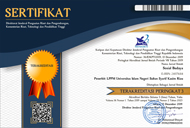Cross Culture Understanding in English Camp Program 2019: An Islamic Perspective from Madurese College Students
Abstract
The term cross cultural understanding had long been known by many people all over the world, but only a few of them knows about the influence of Islamic values along with the cross cultural understanding theme in an event called English Camp Program 2019. Due to that reason, the researcher is interested in digging more about how the Islamic values of Madurese college students affect their understanding about cultural differences of English-speaking countries in English Camp Program. In general, this research will use qualitative descriptive method because the main goal is to describe about those college students’ understanding on cultural differences in relation with Islamic values on students’ background. The result of this research shows that those Madurese college students are still holding on their Islamic values which are coming from their religious background when it comes to understand about cultural differences happened in certain English-speaking countries during the English Camp Program. Also, their Islamic values are not blocking or limiting their openess about receiving some cultural differences happened all over the world.
Keywords
Full Text:
PDFReferences
Akgunduz, Ahmet. (2013). Norms and Values in Islam. Islamic University of Rotterdam.
Ghazali, H., Abu. (1990). Ihya’Ulumuddin, juz VII-IX (Vol. Juz VII-IX). Beirut: Daarul Fikr.
Halstead, J.M. (2007). Islamic Values: A Distinctive Framework for Moral Education. Journal of Moral Education, 36(3), 2007, pp. 283-296. http://dx.doi.org/10.1080/03057240701643056.
Hartman, Andrew. (2009). What is Culture? Raymond Williams and The Cultural Theory of ‘Customary Difference’. New Left Review, Vol. 55, Jan/Feb 2009.
Hoque, A. (2014). Psychology from Islamic Perspective: Contributions of Early Muslim Scholars and Challenges to Contemporary Muslim Psychologists. Journal of Religion and Health, 43(4), 2014, pp. 357-377. doi: 10.1007/s10943-004-432-z.
Kashima, Yoshihisa. 2014. How Can You Capture Cultural Dynamics?. Australian Research Council. Sept 10, 2014. DOI: 10.3389/fpsyg.2014.00995.
Kagan, S. (1990). The Structural Approach to Cooperative Learning. Education Leadership. 47 (4): p. 12-15.
Keesing, Roger. (2007). Theories of Culture. Institute of Advanced Studies, Australian National University. Canberra A.C.T. Australia.
Nuriman & Fauzan. (2017). The Influence of Islamic Moral Values on the Students’ Behavior in Aceh. Jurnal Dinamika Ilmu, Vol. 17, No. 2. doi: http://dx.doi.org/10.21093/di.v17i2.835.
Rafiki, Ahmad & Kalsom Abdul Wahab. (2014). Islamic Values and Principles in the Organization: A Review of Literature. Asian Social Science, Vol. 10, No. 9. Canadian Center of Science and Education.
Torabi, Mahdi. (2015). Islamic Values and Their Influences on Architectural Design. Academia.
Sendjki, Abdelhak. (2015). An Empirical Study on the Influence of Islamic Values in Poverty Alleviation. Journal of Islamic Accounting and Business Research, Vol. 6, Issue. 2, pp. 222-243, https://doi.org/10.1108/JIABR-05-2012-0027.
DOI: http://dx.doi.org/10.24014/sb.v16i2.6908
Refbacks
- There are currently no refbacks.
Published by:
Center for Research and Community Development
Universitas Islam Negeri Sultan Syarif Kasim Riau
Jl. H. R. Soebrantas KM 15,5 ,Tuah Madani, Tampan,
Pekanbaru, Riau 28293
Indexed By:


.jpg)



